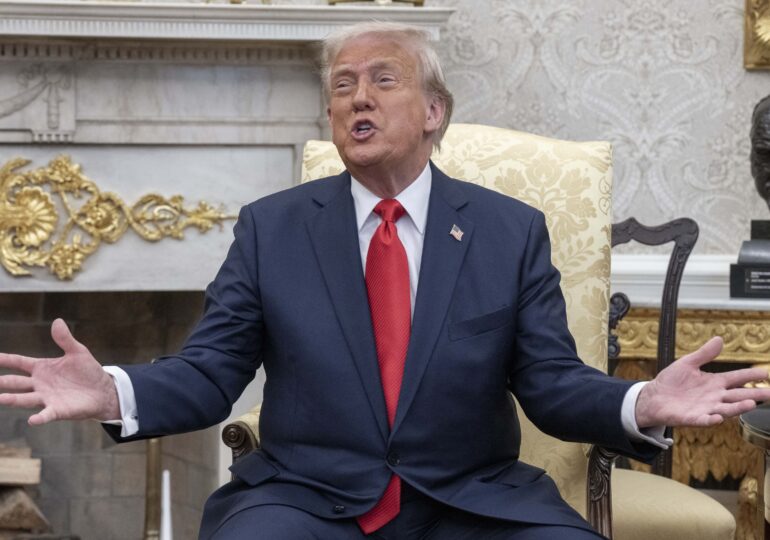Even the most protectionist countries in the EU realize they need new trading partners, as their traditional ally becomes unpredictable.
It seems that Donald Trump could be the best thing that has happened to free trade – at least for Europe, Politico concludes.
By erecting a tariff wall around the United States in the name of the "America First" agenda, the American president unintentionally drives other countries to collaborate with each other to offset the massive blow to their exports.
The EU, under pressure from a more protectionist France and international climate protests, has been trying for the past five years to use trade policy to promote the bloc's values regarding human rights and sustainability - to the frustration of some partners such as India, Indonesia, or the South American Mercosur bloc.
But now, as the United States - their historic ally - chooses to go it alone and disrupt global markets and trade networks with a deluge of tariffs, the European Union is swiftly positioning itself as the liberal and open bloc of global trade.
European Commission President Ursula von der Leyen stated that many countries are now turning to Brussels, considering the EU a reliable partner that does not "change its decisions overnight."
"In an increasingly unpredictable global environment, countries are lining up to collaborate with us," she told Politico Europe.
This change in dynamics excites EU members with a more economically liberal orientation, who have often felt frustrated by France's protectionist impulses.
"We have liberal countries - Sweden, the Nordic and Baltic states. We also have protectionist countries. And then we have the middle states, which are starting to align with our position," said Swedish Minister for Trade Benjamin Dousa, on the sidelines of a meeting of EU trade ministers in Luxembourg.
"There is a sense of urgency among member states: we need to open new trade routes, sign new free trade agreements," he added.
Trump's tariffs - 10% for most countries, 145% for China, 25% for steel, aluminum, and automobiles - are expected to reduce global merchandise trade by 3 percentage points this year.
The World Trade Organization now estimates that global trade will contract by 0.2% this year, and could decrease by up to 1.5% if Trump reinstates higher "reciprocal" tariffs - of 20% for the EU - which he temporarily suspended for 90 days to allow for negotiations.
The Next Level
Since being reconfirmed in December, the second European Commission led by von der Leyen - responsible for the bloc's trade policy - has been in a veritable signing spree of agreements.
Brussels has concluded decades-long negotiations with the Mercosur bloc, as well as with Mexico and Switzerland. It has also resumed negotiations with Malaysia and opened discussions with the United Arab Emirates.
Von der Leyen has committed to finalizing a challenging agreement with India this year and is interested in "closer cooperation" with the Comprehensive and Progressive Agreement for Trans-Pacific Partnership (CPTPP), a free trade pact involving a dozen countries in the Indo-Pacific region, which recently welcomed the UK as a member.
Australia's general elections, scheduled for May 3, could also reignite the process for a trade agreement after negotiations failed at the last minute in 2023.
"Trump's policy will convince everyone to develop trade relations with the rest of the world and thus increase the number of free trade agreements," said Jean-Luc Demarty, former head of the trade department in the Commission during the first Trump administration.
In general, countries like France, Belgium, or Austria, which were once reluctant to open their sensitive markets, are now starting to see trade agreements as a geopolitical necessity, not just an economic advantage.
An example is France, where the entire political class had rejected the EU-Mercosur agreement as politically and economically toxic. However, now, under the pressure of the new trade reality, Paris is softening its stance.
"It doesn't make sense to focus on Mercosur, which was negotiated under overall good conditions," said MEP Marie-Pierre Vedrenne, a member of the Modem party, in the same political family as Prime Minister François Bayrou.
"We need to change our mindset, otherwise we will miss the pace of the world," she added.
A Change of Attitude
For European officials familiar with Trump's style, the current change has a sense of déjà vu.
When Trump took office in 2017, the European Union had just emerged from a "grotesque saga" with Canada, recalls Demarty, referring to the fact that the Belgian region of Wallonia had blocked the ratification of the CETA agreement between Canada and the EU for months.
"Even then, we felt a change in attitude towards trade. And once Trump became very hostile to trade, those who were less enthusiastic began, out of hostility towards Trump, to soften their position," he said.
However, despite this seemingly favorable reconfiguration for liberals in the EU, the path to new trade agreements is not necessarily easier.
A major concern is that Trump's tariffs could redirect Chinese exports excluded from the American market to Europe. This scenario has led to calls for greater protection around the EU's single market.
And even though Trump has raised hopes for a transatlantic trade reconciliation after Italian Prime Minister Giorgia Meloni's visit to the White House, a comprehensive agreement does not seem achievable.
However, this is the goal of future German Chancellor Friedrich Merz, who insists that "the best thing" Europe could do with Washington is to eliminate tariffs.
Since the failure of negotiations for the controversial Transatlantic Trade and Investment Partnership in 2016, the EU has strengthened its standards regarding the environment and human rights. Even if it were to relax or postpone some measures from its green agenda, that would not be enough for an American administration focused solely on economic interests.
For Demarty, resuming discussions on the transatlantic partnership would be "a serious mistake."
"It won't lead anywhere. I led these negotiations for four years and found them impossible to conclude," he concluded.

